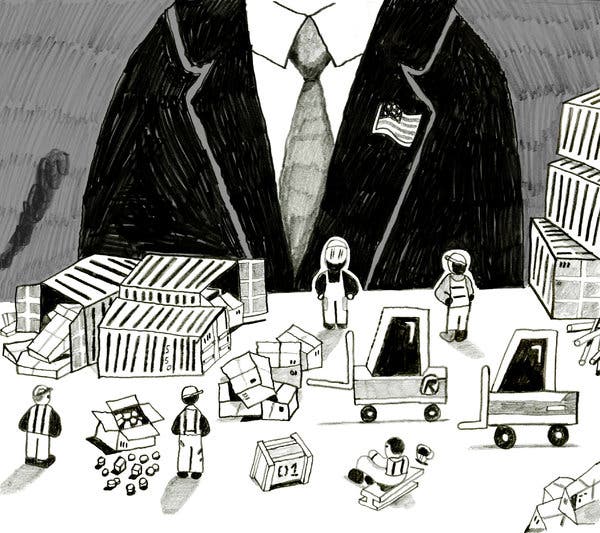The Economic Implications Of Trump's Proposed Movie Tariff

Table of Contents
The Trump administration's proposed movie tariff sent shockwaves through the entertainment industry and sparked intense debate about its potential economic consequences. This policy, targeting foreign-produced films, threatened to significantly impact the Hollywood economy, international trade, and the global film market. This article analyzes the potential economic implications of this controversial trade policy, exploring its effects on the US movie industry, global economic repercussions, and broader political and social considerations. We'll examine the potential for job losses, price increases, and damage to international collaborations, using relevant keywords like "movie tariff," "economic impact," "Trump administration," "trade policy," and "Hollywood economy" to fully explore the issue.
<h2>Impact on the US Movie Industry</h2>
The proposed movie tariff would have had far-reaching consequences for the US film industry, impacting everything from consumer prices to employment levels.
<h3>Increased Prices for Consumers</h3>
The most immediate effect would likely be a rise in ticket prices. A tariff, essentially a tax on imported goods, would increase the cost of foreign films distributed in the US. This increased cost would likely be passed on to consumers, leading to higher ticket prices at cinemas.
- A 10% tariff could lead to a $1-$2 increase per ticket.
- Higher prices could significantly decrease consumer spending on entertainment, potentially leading to reduced movie attendance.
- Smaller, independent cinemas, with lower profit margins, would be disproportionately affected, possibly facing closure.
<h3>Job Losses in Related Industries</h3>
The ripple effect of a movie tariff extends far beyond cinema ticket sales. The film industry supports a vast ecosystem of related businesses and jobs. A decline in movie production and distribution would likely result in significant job losses.
- Post-production jobs, including editing, visual effects, and sound design, would be at risk.
- Jobs in theater operations, including concessions and maintenance, would also be affected.
- Small businesses reliant on the film industry, such as catering companies and equipment rental services, could face closure.
<h3>Impact on US Film Production Companies</h3>
Major and independent US film studios would face considerable challenges. Increased production costs due to tariffs on imported materials and equipment would reduce profitability. This could stifle innovation and investment in new projects.
- Increased production costs would make US films less competitive internationally.
- Profitability would decrease, potentially leading to fewer films being produced.
- Investment in new projects could slow down, impacting the overall health of the industry.
<h2>Global Economic Repercussions</h2>
The proposed movie tariff’s impact wouldn't be confined to the US; it would have far-reaching global economic repercussions.
<h3>Retaliatory Tariffs from Other Countries</h3>
Other countries would likely retaliate by imposing tariffs on US goods, triggering a trade war with devastating consequences.
- Retaliatory tariffs could target agricultural products, manufactured goods, and other US exports.
- This could severely impact American industries and farmers, leading to job losses and economic instability.
- The overall effect could be a significant contraction in international trade, harming the global economy.
<h3>Damage to International Collaboration in Filmmaking</h3>
International co-productions and collaborations are vital to the film industry. A tariff could damage these collaborations severely.
- Fewer joint ventures between US and foreign filmmakers would result.
- US filmmakers would have reduced opportunities to work abroad, limiting their access to international talent and markets.
- The overall quality and diversity of films could suffer.
<h3>Impact on Global Film Distribution</h3>
Distributing US films internationally would become more expensive and complex, reducing the accessibility of American films in foreign markets.
- Increased distribution costs would make US films less competitive in international markets.
- Foreign audiences would have less access to US films, weakening US soft power and cultural influence.
- The international film market would become less integrated and less vibrant.
<h2>Political and Social Considerations</h2>
Beyond the economic impact, the proposed movie tariff has significant political and social implications.
<h3>Political Fallout and International Relations</h3>
The tariff would strain diplomatic relations with other countries, damaging trade agreements and negatively affecting the US's global reputation.
- Trade relationships with key allies and trading partners could be damaged.
- Existing trade agreements could be threatened or renegotiated under duress.
- The US's global standing and influence could decline.
<h3>Public Opinion and Consumer Response</h3>
Public opinion and consumer response could significantly influence the success or failure of such a policy.
- Public protests and boycotts of affected films are potential outcomes.
- Consumers may shift their entertainment consumption habits, opting for alternative forms of entertainment.
- This could lead to further economic damage to the film industry.
<h2>Conclusion: Assessing the Long-Term Effects of the Movie Tariff Debate</h2>
Trump's proposed movie tariff carries significant short-term and long-term economic risks. The potential for increased prices, job losses, retaliatory tariffs, and damage to international collaboration paints a bleak picture for the US film industry and the global economy. Understanding the economic implications of proposed movie tariffs is crucial for the future of the film industry and international relations. Continue your research and advocate for policies that support a healthy and competitive global film market. Let's work together to understand the complexities of trade policy and its impact on the movie industry and beyond.

Featured Posts
-
 Mariners Vs Reds Live Stream Mlb Game Tv Channel And Online Options
May 07, 2025
Mariners Vs Reds Live Stream Mlb Game Tv Channel And Online Options
May 07, 2025 -
 Konflikt I Nhl Kan En Ny Stjaernturnering Vara Loesningen
May 07, 2025
Konflikt I Nhl Kan En Ny Stjaernturnering Vara Loesningen
May 07, 2025 -
 Hd
May 07, 2025
Hd
May 07, 2025 -
 Who Wants To Be A Millionaire Celebrity Special The Ultimate Guide
May 07, 2025
Who Wants To Be A Millionaire Celebrity Special The Ultimate Guide
May 07, 2025 -
 Svedsko Na Ms S 18 Hraci Nhl Vyhoda Proti Nemecku
May 07, 2025
Svedsko Na Ms S 18 Hraci Nhl Vyhoda Proti Nemecku
May 07, 2025
